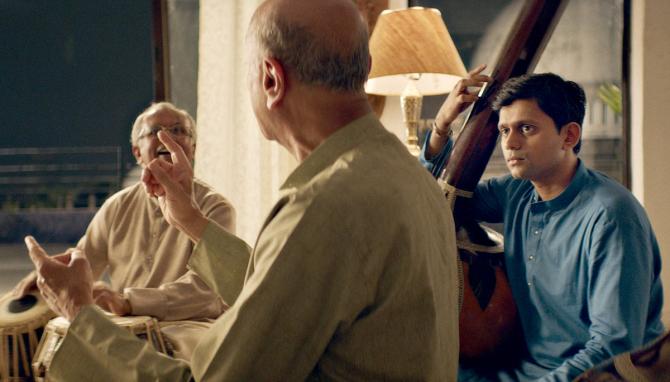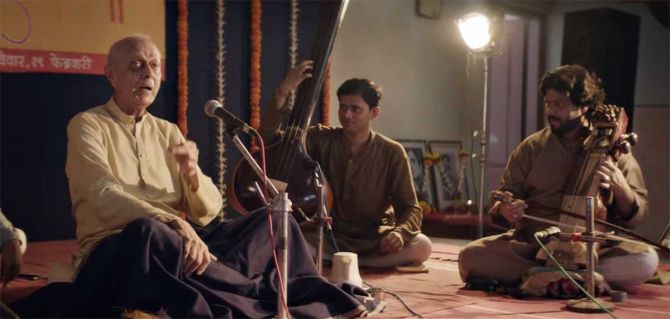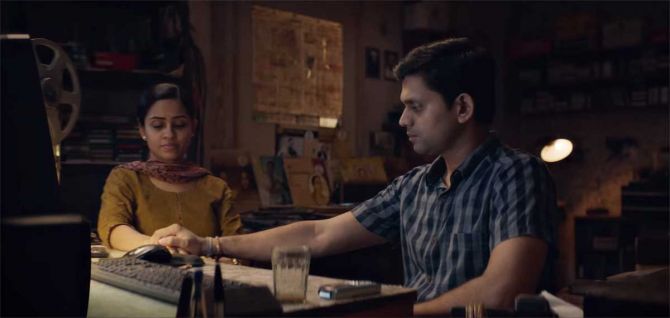'Tamhane's densely composed shots achieve what a vacuously whizzing camera seldom does.'
'Like those Renaissance Paintings in which a bewitching lady is shown posing for a portrait, and daily life plays out in a corner unruffled, Tamhane's static frames have a hundred interesting things happening within them,' observes Sreehari Nair.

I was some 20 minutes into Chaitanya Tamhane's The Disciple when scenes from Susan Orlean's The Orchid Thief began to stream through my head almost like ticker tape.
'What's a story about fanatical orchid lovers set in Florida got to do with a Mumbai-set story about Indian classical music?' I wondered, freezing my face into a look of intense academic interest. But then, Tamhane's fabulous new movie kept chugging along, and caught up in its languorous flow, the parallels became more and more obvious to me.
As demonstrated through her dream of a book, penetrating self-contained worlds is Susan Orlean's *thing*.
Hot on the trail of a very basic goal -- 'I want to know what it feels like to care about something passionately' -- Orlean ends up following an entire sub-culture.
And her odd yet glittering writing career is a compendium of tales where she describes, in great detail, crazy coteries, not just orchid hunters but also taxidermists, umbrella inventors, pigeon racers, origami artists, and animal actors.
Reading Orlean's accounts, we come to realise that each of these obsessions -- composed of its pagan deities, cathedrals, secret chambers, private language, and inside jokes -- operate more or less like a fetish.
Self-contained worlds and sub-cultures, you could say, are Orlean's sweet spots; they are what cause her to flash her gummy smile and hit the ground running.

We get snapshots of such a world in The Disciple.
Tamhane's film, too, concerns itself with a sub-culture, one in which we hear a doddering, wheelchair-bound classical singer, well into his 80s, being described as his illustrious father's son. (Talk about Anxiety of Influence striking the geriatric circuit!).
This is a world where reverence is not merely demanded but expected (the singers touch their ears every time they mention a guru's name, and when they have to mention the names of three gurus in succession, their ears remain tugged for an inordinately long period of time).
Tamhane gets us up-close not just with musicians and their acolytes but also serious fans occupying different gradients of taste, lifestyle journalists who view these musicians as exotic subjects, collectors of rarely-heard artists, archivists, and then some.
In a world of obsessors who are this close-knit, in a world of such inbreeding, there's often the problem of one's vocabulary failing to match up to one's enthusiasm. No wonder then that a fan fumbling for a perfect epithet to shower upon a virtuoso, a wizard, can think of nothing better than Yedzavya: a multipurpose Marathi cuss word, which, in this context, translates as Mad F*****.
Tamhane is blessed with the good sense to smile at the many contradictions such a world presents.
Morals and Theses are of no particular interest to him; all he wishes to offer us is an immersion into certain everyday realities.
In Court, he wanted the exasperations of the various players, enmeshed in the legal system, to materialise in real time. Here, he wants to photograph the pauses that occur between music lesson delivered and music lesson ingested; he wants us to catch the ragas that are generated between two tea sips.
The story he's trying to tell may possess the arc of a tragedy, but this is not the kind of tragedy that drains life out of you.
On the contrary, it's the kind of tragedy that allows you to take in more, one that fills you up.
Much has been made about his static camera, but the fact of the matter is that Tamhane's densely composed shots achieve what a vacuously whizzing camera seldom does. Like those Renaissance Paintings in which a bewitching lady is shown posing for a portrait, and daily life plays out in a corner unruffled, Tamhane's static frames have a hundred interesting things happening within them.
There's a concert of classical music in progress, but your eyes wander off to those ceiling fans with long heron-like necks, and recording instruments that emit whines of agony.
Watch out for how people walk in, kurta-clad connoisseurs with gingerly feet; watch out for a lady in the audience who stops to adjust her sari, and another who sits tapping her feet and moving her head as if entering into measured hallucination.

Tamhane's trademarks, the technical aspects, are all originals -- because they come out of his worldview.
I especially love how he impels his principals into a crowd, and now and again, makes them emerge from a crowd.
A 'meditative' film-maker he's often categorised as, but listen closely and his characters are frequently jesting, or engaging in verbal cross-fires, or discharging cutting remarks (That's how they talk; and isn't that beautiful?).
The protagonist of this film, Sharad Nerulkar (played by singer Aditya Modak), uses the following words to characterise his father, who had introduced Sharad to classical music, who had passed on to him the disease, as it were: 'Father's stories were the best parts of him. His singing was just about okay.'
Sharad, we first meet in the year 2006, as a young man, in a world inhabited primarily by old men, some even prigs. It is comprehensible, then, as to why there's a courteous vivacity about the way Sharad moves and behaves.
When he rehearses for an upcoming performance, he rehearses even the pranaams that have to paid, and the cursory smiles that have to be shot at his co-players. And when his guru talks about the strict foundries that have molded figures such as himself, Sharad's eyes tell you that the era being exalted is the era he truly wants to belong to.
Youth, in the movies, is customarily represented as wanting to break free. Here's a young man who wants to stay 'shoved in'.
He's also a man trying to carve out a niche in an already self-contained world.
In certain scenes, he bears a stark resemblance to some of those alpha-cinephiles, who, for every French New Wave film-maker you name, will tell you: Oh, but have you watched Jean-Pierre Melville? Melville was the real deal. He was Godard's God.

When the movie skips back in time, we see little Sharad being indoctrinated into this private world by his father. The kid attends a concert, where he sits among a group of oldies, his slender hand doing its best to keep taal.
Is this a story of willed obsession, then?
Is this man's talent not enough to square off with his devotion?
In the intricate universe that Tamhane has constructed, such easy deductions are hard to come by.
You would be disappointing the baby-faced film-maker, I believe, you would be dimming out his googly eyes, if you read this film as a manual for self-improvement: How Sharad Nerulkar could have conducted himself better, how he could have been a more successful singer, etc.
There's also the danger of interpreting the film as Tamhane's revenge against pseudo-intellectuals: Those egghead experts who don't care two hoots about the pleasure principle. To attach such theories to this work would be to sell short The Disciple's generous gait (This is a motion picture that walks that thin line between pseudo-intellectualism and Ek Doctor Ki Maut).

Nerulkar lives his life the Christopher Hitchens way -- he's always looking to 'acquire parents'.
Riding his bike along the Dadar of Paithani Sari Showrooms, and along neon-barred flyovers, he listens to recordings of Maai: A legend of the 1970s and 1980s, who continues to lord over Sharad's gurus as their Fairy Godmother (To her students, Maai is the genius who did not fritter away her talent by performing in public. Such was her asceticism).
The recordings are expressions of tough love.
They tell you that to try mastering this craft is to doom yourself to 'disciplehood' for life.
The larger memorandum goes something like this: 'You are about to enter a special circle that calls for a fierce fidelity. Walk away while you can; for this is no place for toe-dippers, you have to dive right in. And there's no guarantee even then that you'll reach the silts.'
The brilliance of Tamhane's script can be previewed in the way Maai's speeches have been written.
The old lady hardly repeats a dictum, and, every line she utters, adds to our knowledge of the world being tracked. You are told about the improvisatory nature of Indian Classical Music, which is its special appeal, and which, to my ill-informed mind, makes it seem closer to Jazz than Western Classical. The catch, however, is that as in Jazz, you have to practice and practice, just so that you can get up on the stage and improvise freely.
This is the sort of music that can only come out of one's pathos; and so, a classical singer who is loved by the sponsors improvises one way, and a singer who has spent all his life in a one-room apartment putting down the fat cats improvises another way.
The kind of asceticism that Maai swears by, works for some, and sucks blood when applied to others.
Sharad Nerulkar sees this asceticism as the essence of his art, but it's probably what's stopping him from singing, as his teacher phrases it, 'with an open throat'.

When the movie flashes forward and we meet Nerulkar in 2018, he's very much the amateur who has delivered on Maai's appeal for a lifetime of learning. But then, how do amateurs reconcile with the impatience of wanting to be some wide-eyed kid's guru?
He, who once prided himself on being more mature than his age, now finds himself behind the times.
And after dismembering the enthusiasm of a student who wants to join a music band, and after being chided for his passive-aggressive attitude, Sharad Nerulkar, all fat and self-righteous fury, makes a conscious effort to loosen up -- by treating himself to a quick burst of cricket with some random boys (The classic, 'Ek ball please?'), and dancing alone at home to a fast number.
In a film, where even a passing character is given the space to convey the full range of his or her personality, Aditya Modak does a terrific job of playing someone whose capacity to feel stands offset by large areas of unfeeling.
In a scene which has a peanut-munching connoisseur (Tamhane is a master at writing these one-scene characters) taking the sheen off Maai's past, the surprise on Modak's face is so genuine, that he ends up providing you with a semblance of the sexual animal lurking behind the prudish manners. And later, as the older Sharad, he lets this animal loose.
You, then, see a man whose yearning for excellence is being displaced by a yearning for the body, and, for a better life, but, slowly, slowly.
With every successive riyaaz, he seems to be moving more and more toward the spirit of freethinking, and in his very last stage performance, he sings out of the emptiness inside him.
Though he hits all the wrong notes, his singing, in that scene, is tinged with personal pain: he seems to be protesting the victories of those he considers undeserving, and protesting, above all, the failure of his idols.
In these sequences, and particularly in the second half, the camera begins to move closer and closer to the actors' faces, and the temptation to infer themes might become intense.
How our father figures screw us over; the many dangers of harboring excessive commitment to one's craft; the dangers of chasing a formal perfection that lies beyond you -- themes are there for your taking; stuff yourself silly with as many as you can.
But do understand that no artist worth his salt ever thinks thematically.
And an artist like Tamhane, surely, wouldn't hunker down on his writing chair, announcing to himself: 'Let me, this time, try making something about the Death of Idealism. Ooooh, how about an ascetic who winds up a self-promoter?'
Trust me, only ideologues run into such fits of sanctimony.

Themes are by-products; they will be produced by what you do. They are the steam that rises off the forest canopy, if you may. The real business is the canopy, with its thousand very specific details.
Even as the second half of The Disciple gives you a more intimate view of its protagonist, Tamhane begins constructing another world on the side.
Reserve an eye for the reality show that he contrives, as a running joke of sorts. The architecture of this show has been so finely thought up -- down to its lighting, its costumes, its 'meet the contestant' bits, its sentimental hullaballoo, its story of an innocent small-town girl who finally croons in leather and smoky lipstick -- that for a long time, I was under the happy impression that I was watching excerpts from an actual television programme.
The truth of that little cul-de-sac, Fame India, of it being a work of imagination, of it having been wrenched into existence, tells you a lot about Chaitanya Tamhane. And artistic mischiefs like that are what leave you breathless with anticipation.
Will Dileesh Pothan attack next the backwater land of toddy shops and tortoise meat, or, will he set his next movie in the Thiruvananthapuram of the Secretariat, and Bakery Junction, and Palayam Mosque? Likewise, what world, which sub-culture, will Tamhane tackle hereafter? Farmhouses? Municipal Offices? Hip-hop artists? Mortuaries?
Deny them I can for the sake of own sanity, but these are the questions that keep me up at night.
Perhaps the key difference between Chaitanya Tamhane and Sharad Nerulkar is that Tamhane achieves a sense of immersion but leaves a little space open, always, for the wink to slide in. This is why, despite the tight grip it casts, The Disciple seems quite loosely bound, and, as in the case of Court, an undertow of irony sweeps over its narrative.
For those who wish to know in advance whether they are getting into a satire, a documentary, or an art-house venture, imagine being held in a state of nervous imbalance by a film that traverses all these labels, without pedantically conforming to one.
Tamhane makes you study carefully every face that darts by and scan each one of them for the stories that might be contained in a nod of the head, a piercing look, a chewing motion.
He builds you up to the awareness that the hero of this film is an aesthete in pursuit of the perfect khayal. And just when you think you have his single-mindedness figured out, you see him in front of a computer screen pleasuring himself to a completely different sound.
Sreehari Nair is a frequent contributor to Rediff.com; you can read his earlier contributions here.
Feature Presentation: Ashish Narsale/Rediff.com











